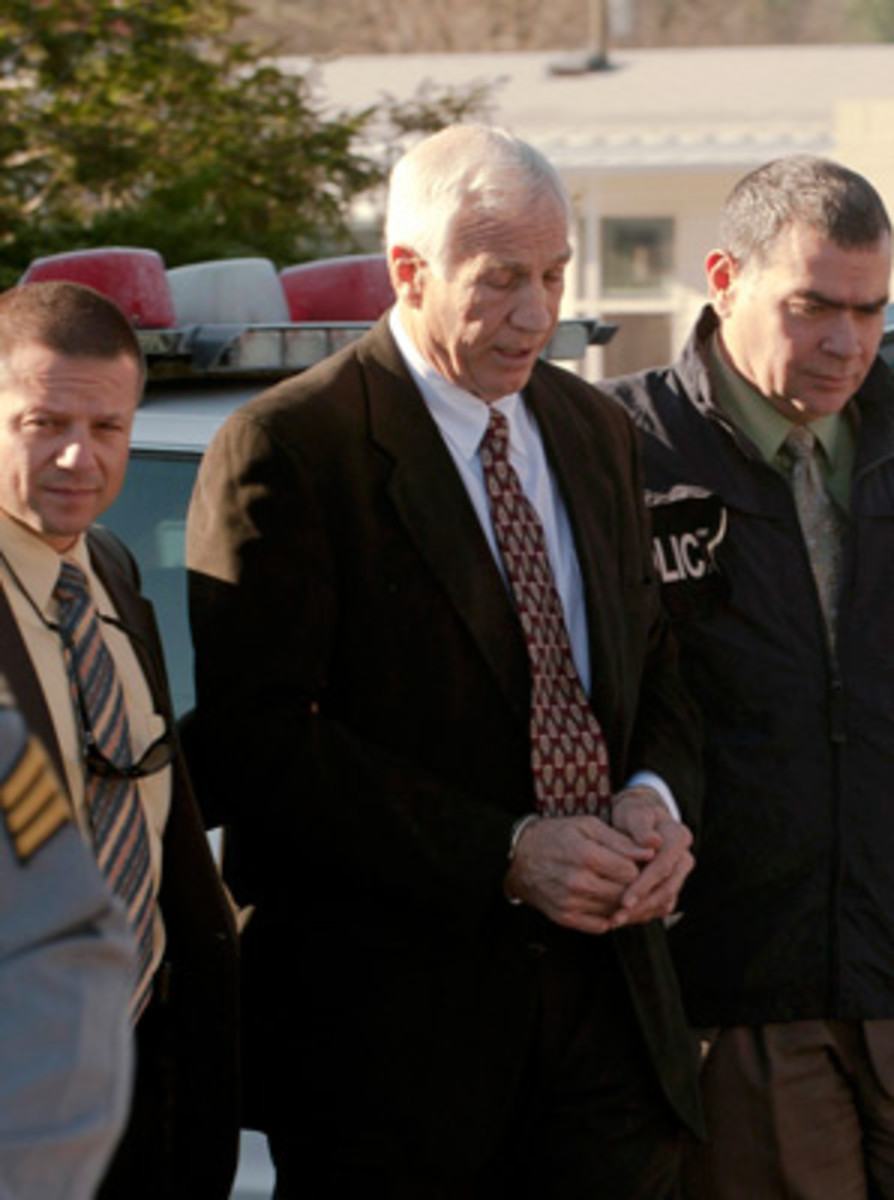
Filled with scandals and sorrow, 2011 will not be missed
Sports scandals age poorly. What seems everlastingly egregious is quickly forgotten as time applies its rosy hue. Victories and spectacular plays endure, while disturbing events get pushed to a distant corner of memory's basement.
But it's difficult to imagine that even a decade from now, when the varnishing of 2011 will be complete, that the year's shocking string of improprieties won't remain in the fore. The breadth of wrongdoing was so vast, the sins so shocking, and the people and teams involved so high profiled, that 2011 may be the rare sports year recalled more for its bad than its good.
The list is long and depressing. There were allegations of sexual abuse at Penn State, Syracuse, by a prominent Philadelphia sports columnist, the former head of the Amateur Athletic Union and others. There were allegations or admissions of major NCAA violations committed at Ohio State, Miami, South Carolina and other schools.
There was the Fiesta Bowl financial mess, the Dodgers ownership battle, labor disputes in the NFL and NBA, the Vancouver riots, the seemingly daily allegations of impropriety involving FIFA, numerous athlete arrests or convictions (such as boxer Floyd Mayweather for domestic abuse) and much, much more.
If you were ranking the scandals, the allegations of sexual abuse at Penn State involving former assistant football coach Jerry Sandusky would be the runaway winner. The horrific crimes alleged combined with claims of a cover-up by high-ranking school officials, including legendary former coach Joe Paterno, make it one of the worst sports scandals in history.
But even if you removed Penn State from the judging, it was a banner year for the bad. It is saying something that a positive test for performance-enhancing drugs by Brewers outfielder Ryan Braun, the reigning National League MVP, might not crack the year's Top 10.
Rather than use this space to recap the wrongdoing at Penn State or any of the other incidents of impropriety that have been well covered, it seemed worthwhile to pluck one of the lesser-known scandals from the pile. What better way to illustrate the scope of wrongdoing in 2011 than to turn the light on a case of malfeasance that didn't get the attention it deserved?
In November, at the height of the Penn State fury, the NCAA sent a notice of allegations to Central Florida. Investigators listed violations they believed had been committed, most of which centered on the actions of representatives of a sports agency. Two runners for that agency were accused of helping the Central Florida football and basketball teams recruit players, violations first reported by The New York Times.
Those accusations were damning enough, but the NCAA found more. During its probe, it discovered that Central Florida athletic director Keith Tribble attempted to arrange a job for the parent or guardian of a recruit, provided an improper inducement to the mother of another prospect, arranged a tuition waiver for one of the runner's friends, and also lied when asked about those matters by compliance officials.
Tribble resigned when Central Florida received the notice of allegations (as did an assistant football coach, and the men's basketball coach was suspended three games). School officials claimed, as most universities do when they are caught, that the cheating did not indicate a widespread problem. Of course, the fact that Tribble, the CEO of the department, was involved in the wrongdoing contradicted that completely.
It was, in some ways, unprecedented behavior. The athletic director of a Division I program was not only aware that runners were recruiting for athletic teams but he also aided them in their actions. Athletic directors ignore or cover-up wrongdoing; rarely do they get their hands dirty in the way that Tribble did.
The Central Florida mess was the kind of scandal that should have added more weight to the call for NCAA reform; it should have put heat on Central Florida president John Hitt to resign or be dismissed; it should have stopped the Big East Conference from adding the Knights in 2013, which the conference formally did a short time after the notice of allegations went public.
Instead, the whole mess flew under the radar due to the news coming out of Penn State. To draw attention to it at the time seemed trivial. What are NCAA violations when compared to sexual abuse?
When history judges 2011, it will inevitably frame it as the year of sexual abuse scandals in sports. This would not be wrong. But the wrongdoing that befell the sports world over the past 12 months was broader. There was every type and it occurred at every level. Heinous acts were committed by the powerless and the powerful. It was so pervasive that, for once, victories and triumphs may not erase our remembrances of the wrongdoing that occurred. It will endure as a year of sins and of sorrow.





